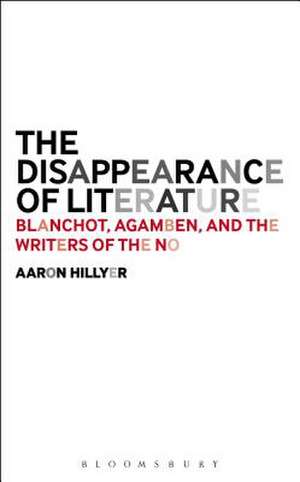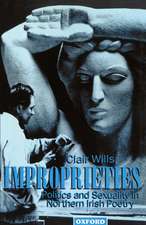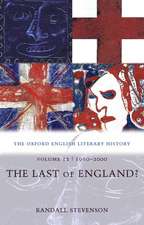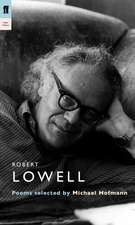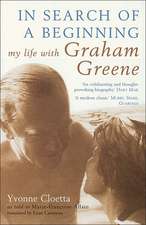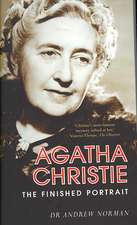The Disappearance of Literature: Blanchot, Agamben, and the Writers of the No
Autor Dr. Aaron Hillyeren Limba Engleză Paperback – 25 mar 2015
| Toate formatele și edițiile | Preț | Express |
|---|---|---|
| Paperback (1) | 254.75 lei 6-8 săpt. | |
| Bloomsbury Publishing – 25 mar 2015 | 254.75 lei 6-8 săpt. | |
| Hardback (1) | 712.90 lei 6-8 săpt. | +136.80 lei 4-10 zile |
| Bloomsbury Publishing – 20 noi 2013 | 712.90 lei 6-8 săpt. | +136.80 lei 4-10 zile |
Preț: 254.75 lei
Preț vechi: 293.96 lei
-13% Nou
Puncte Express: 382
Preț estimativ în valută:
48.75€ • 51.02$ • 40.57£
48.75€ • 51.02$ • 40.57£
Carte tipărită la comandă
Livrare economică 31 martie-14 aprilie
Preluare comenzi: 021 569.72.76
Specificații
ISBN-13: 9781501306808
ISBN-10: 1501306804
Pagini: 168
Dimensiuni: 152 x 229 x 25 mm
Greutate: 0.23 kg
Editura: Bloomsbury Publishing
Colecția Bloomsbury Academic
Locul publicării:New York, United States
ISBN-10: 1501306804
Pagini: 168
Dimensiuni: 152 x 229 x 25 mm
Greutate: 0.23 kg
Editura: Bloomsbury Publishing
Colecția Bloomsbury Academic
Locul publicării:New York, United States
Caracteristici
Highlights an important connection between contemporary continental philosophy and a vibrant strand of contemporary literature
Notă biografică
Aaron Hillyer received his Ph.D from the University of Nebraska in 2011.
Cuprins
Introduction: Writing of the No Situation, The Non-Place of the Human,The Shadow and the Antidote, Technology and Resistance, Disappearance, Study 1 - Agamben and Blanchot on Desoeuvrement The Open, The Sacred and the Profane, Naked Life, Desoeuvrement, Pataphysics, God, The Great Ignorance, The Teacher and the Student, Mysticism and Writing,The Land of the Magi 2 - The (Para-)Ontology of Disappearance Survival, Bartleby, Inactivity, Image, Resistance of the Object, Invisible Man, Aesthetics, Intransmissibility, Para-Subject, The End of Storytelling, Beyond Good and Evil, Literature as Procedure, Asignifying Word, Mystery, Surprise, Dictator, Gestural Language, Self Slander, "Then the time has come" 3 - The Potential of StudySurvival, The Student Before the Law, The Invisible Door, Study and Resistance, Educative Violence, The Autodidact , The Logic of Sovereignty, Closing the Door of the Law 4 - Toward a Constellation of Literature's Disappearance Neutral Power, Near-death, Neuter, Void, Philopoesis, Linguistic Absolute, Collectivity, Superimposition, Dreams, De-quilting, Light, Awakening, Blindness, With What Words?5 - Anne Carson and the Study of Mysticism Pan Tolmeton, The Dance of Jealousy, Decreation, The FarNear6 - Enrique Vila-Matas and the Self-Study of Writing Irony, Style, Happiness7 - Threshold: The Friendship of Literature Friendship, That Light Notes Index
Recenzii
The Disappearance of Literature is not only a thrilling addition to the growing body of work tracing the emergence of a literature of disappearance, but it also signals the birth of an important new critical voice. In recent years, few people have spoken about what escapes language with such extraordinary eloquence.
Provides insightful analysis of a number of important conversations that link Blanchot and Agamben-indirectly, through their separate engagement of writers like Georges Bataille, Walter Benjamin, and Franz Kafka, and, also indirectly, through Agamben's veiled communication with Blanchot himself. . Hillyer's book offers some of its most compelling insights near the end, when literature becomes a means of reflecting upon the more general questions of ontology examined earlier in the book. . The final, short chapters of Hillyer's book solidify the sense that his work takes a fresh angle on writers like Blanchot and Agamben who have rightly garnered the attention of many scholars and many books. Turning to the "writers of the no" gives his study that sense of freshness and demonstrates the relevance-perhaps the necessity-of Blanchot and Agamben's thought in the work of some of the most interesting, thought-provoking, and challenging writing in contemporary literature.
In this book, Aaron Hillyer attends, with sensitivity and erudition, to the implications of one of the most startling paradoxes of literature: that its essence may be disappearance. Through a sequence of meditations on the vicissitudes of negativity, with Giorgio Agamben and Maurice Blanchot as his guides, Hillyer explores the divagations of writing in the non-works of Melville, Kafka, César Aira, Anne Carson, Enrique Vila-Matas, and others. In doing so, he attempts to imagine 'a new human innocence.'
The disappearance of literature is one of Maurice Blanchot's most provocative, paradoxical, yet affirmative propositions, one that binds the future of writing neither to modernist autonomy nor to oppositional negativity, but to an essential vanishing of all essentiality. In this probing new book, Aaron Hillyer expertly traces the faultlines of interpretation and misunderstanding between Blanchot and Agamben regarding literature's vocation, calling on a host of philosophical and fictional writings, from Bataille to Benjamin, Derrida to Duras, César Aira to Anne Carson and Enrique Vila-Matas, in order to study, solicit, and survey the possibilities and impossibilities announced by literature's disappearance.
Provides insightful analysis of a number of important conversations that link Blanchot and Agamben-indirectly, through their separate engagement of writers like Georges Bataille, Walter Benjamin, and Franz Kafka, and, also indirectly, through Agamben's veiled communication with Blanchot himself. . Hillyer's book offers some of its most compelling insights near the end, when literature becomes a means of reflecting upon the more general questions of ontology examined earlier in the book. . The final, short chapters of Hillyer's book solidify the sense that his work takes a fresh angle on writers like Blanchot and Agamben who have rightly garnered the attention of many scholars and many books. Turning to the "writers of the no" gives his study that sense of freshness and demonstrates the relevance-perhaps the necessity-of Blanchot and Agamben's thought in the work of some of the most interesting, thought-provoking, and challenging writing in contemporary literature.
In this book, Aaron Hillyer attends, with sensitivity and erudition, to the implications of one of the most startling paradoxes of literature: that its essence may be disappearance. Through a sequence of meditations on the vicissitudes of negativity, with Giorgio Agamben and Maurice Blanchot as his guides, Hillyer explores the divagations of writing in the non-works of Melville, Kafka, César Aira, Anne Carson, Enrique Vila-Matas, and others. In doing so, he attempts to imagine 'a new human innocence.'
The disappearance of literature is one of Maurice Blanchot's most provocative, paradoxical, yet affirmative propositions, one that binds the future of writing neither to modernist autonomy nor to oppositional negativity, but to an essential vanishing of all essentiality. In this probing new book, Aaron Hillyer expertly traces the faultlines of interpretation and misunderstanding between Blanchot and Agamben regarding literature's vocation, calling on a host of philosophical and fictional writings, from Bataille to Benjamin, Derrida to Duras, César Aira to Anne Carson and Enrique Vila-Matas, in order to study, solicit, and survey the possibilities and impossibilities announced by literature's disappearance.
